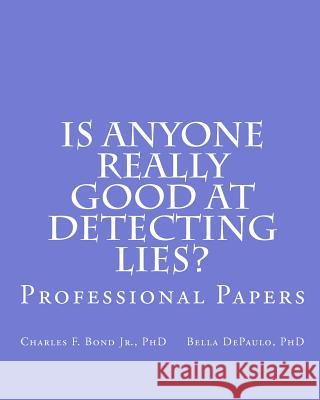Is Anyone Really Good at Detecting Lies?: Professional Papers » książka
Is Anyone Really Good at Detecting Lies?: Professional Papers
ISBN-13: 9781461026242 / Angielski / Miękka / 2011 / 178 str.
The savvy lie-detector has become a staple of popular culture. Human lie detectors, in the papers collected here, are those who skillfully separate truths from lies when observing or interacting with another person - and they do it using just what they can see or hear. It is not just in the media that the legend of the impressive human lie detector thrives - some scholars have endorsed the notion, too. But is it really so? Ph.D. social psychologists Charles F. Bond Jr. and Bella DePaulo have been studying the psychology of deceiving and detecting deceit for decades. In this anthology, they toss some empirically-grounded skepticism at claims about humans' abilities to tell when other people are lying. The journal articles address questions such as the following: 1.Maybe ordinary people aren't so great at detecting lies, but don't they get more insightful over time as they get to know someone better? 2.What about people who try to detect lies as part of their jobs - and have done so for years: Are they especially successful at knowing when other people are lying? 3.Are there some people who are so talented at detecting lies that they deserve to be called lie-detection wizards? 4.Are there times when other people strike us as dishonest even when they are telling the truth? When might that happen? 5.Suppose we examine every study that has ever been reported on skill at distinguishing lies from truths: What would that lead us to conclude about the human ability to detect lies? 6.Now suppose we scrutinize every available study for evidence of individual differences in the ability to detect lies: Will we find that some people are great and others are awful? Or will we find that some people consistently just look more honest than others, regardless of whether they are lying or telling the truth?
Zawartość książki może nie spełniać oczekiwań – reklamacje nie obejmują treści, która mogła nie być redakcyjnie ani merytorycznie opracowana.











